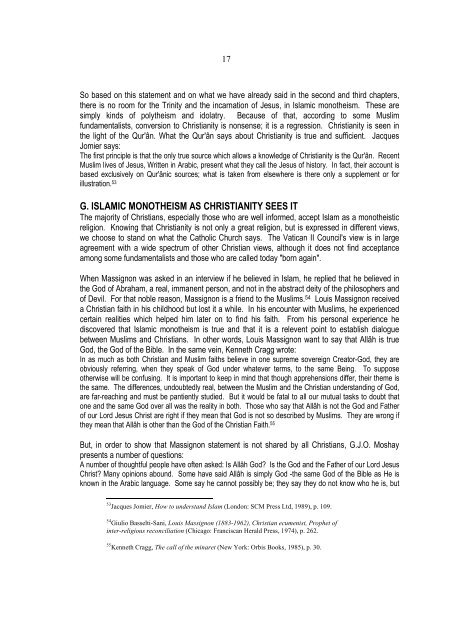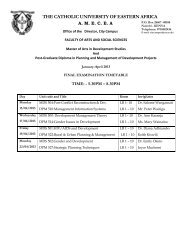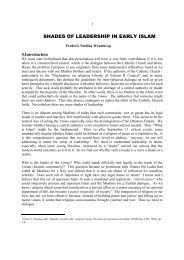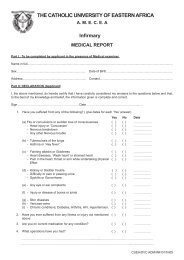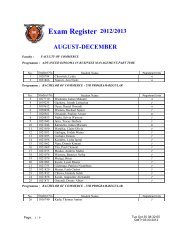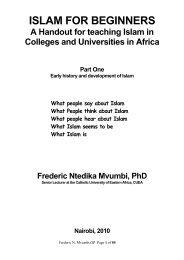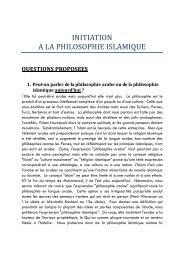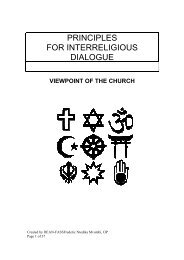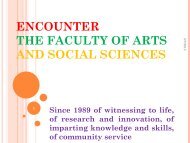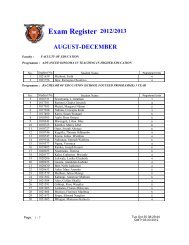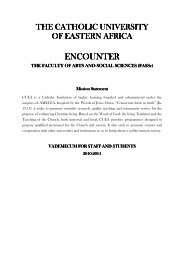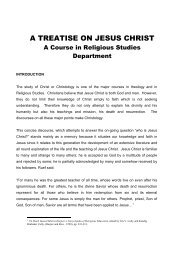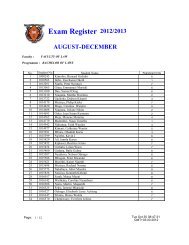INTRODUCTION TO ISLAMIC THEOLOGY.pdf - CUEA
INTRODUCTION TO ISLAMIC THEOLOGY.pdf - CUEA
INTRODUCTION TO ISLAMIC THEOLOGY.pdf - CUEA
Create successful ePaper yourself
Turn your PDF publications into a flip-book with our unique Google optimized e-Paper software.
17So based on this statement and on what we have already said in the second and third chapters,there is no room for the Trinity and the incarnation of Jesus, in Islamic monotheism. These aresimply kinds of polytheism and idolatry. Because of that, according to some Muslimfundamentalists, conversion to Christianity is nonsense; it is a regression. Christianity is seen inthe light of the Qur'ân. What the Qur'ân says about Christianity is true and sufficient. JacquesJomier says:The first principle is that the only true source which allows a knowledge of Christianity is the Qur'ân. RecentMuslim lives of Jesus, Written in Arabic, present what they call the Jesus of history. In fact, their account isbased exclusively on Qur'ânic sources; what is taken from elsewhere is there only a supplement or forillustration. 53G. <strong>ISLAMIC</strong> MONOTHEISM AS CHRISTIANITY SEES ITThe majority of Christians, especially those who are well informed, accept Islam as a monotheisticreligion. Knowing that Christianity is not only a great religion, but is expressed in different views,we choose to stand on what the Catholic Church says. The Vatican II Council's view is in largeagreement with a wide spectrum of other Christian views, although it does not find acceptanceamong some fundamentalists and those who are called today "born again".When Massignon was asked in an interview if he believed in Islam, he replied that he believed inthe God of Abraham, a real, immanent person, and not in the abstract deity of the philosophers andof Devil. For that noble reason, Massignon is a friend to the Muslims. 54 Louis Massignon receiveda Christian faith in his childhood but lost it a while. In his encounter with Muslims, he experiencedcertain realities which helped him later on to find his faith. From his personal experience hediscovered that Islamic monotheism is true and that it is a relevent point to establish dialoguebetween Muslims and Christians. In other words, Louis Massignon want to say that Allâh is trueGod, the God of the Bible. In the same vein, Kenneth Cragg wrote:In as much as both Christian and Muslim faiths believe in one supreme sovereign Creator-God, they areobviously referring, when they speak of God under whatever terms, to the same Being. To supposeotherwise will be confusing. It is important to keep in mind that though apprehensions differ, their theme isthe same. The differences, undoubtedly real, between the Muslim and the Christian understanding of God,are far-reaching and must be pantiently studied. But it would be fatal to all our mutual tasks to doubt thatone and the same God over all was the reality in both. Those who say that Allâh is not the God and Fatherof our Lord Jesus Christ are right if they mean that God is not so described by Muslims. They are wrong ifthey mean that Allâh is other than the God of the Christian Faith. 55But, in order to show that Massignon statement is not shared by all Christians, G.J.O. Moshaypresents a number of questions:A number of thoughtful people have often asked: Is Allâh God? Is the God and the Father of our Lord JesusChrist? Many opinions abound. Some have said Allâh is simply God -the same God of the Bible as He isknown in the Arabic language. Some say he cannot possibly be; they say they do not know who he is, but53 Jacques Jomier, How to understand Islam (London: SCM Press Ltd, 1989), p. 109.54 Giulio Basselti-Sani, Louis Massignon (1883-1962), Christian ecumenist, Prophet ofinter-religious reconciliation (Chicago: Franciscan Herald Press, 1974), p. 262.55 Kenneth Cragg, The call of the minaret (New York: Orbis Books, 1985), p. 30.


